#sworn brothers basically‚ but visually make it be marriage
Explore tagged Tumblr posts
Text
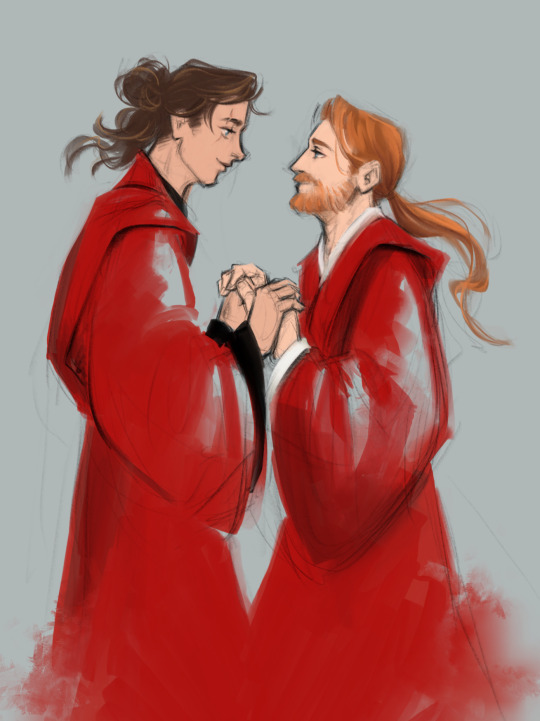
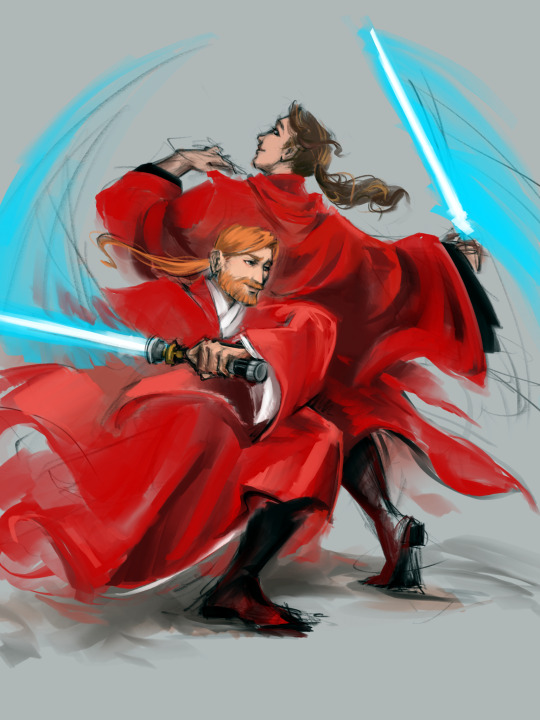
An AU in which forming a Force dyad is a revered phenomenon, as it gifts the dyadic Force users with unique powers and deepens their attunement to the Force. This occurrence is still sporadic, but common enough for a ceremony to be created. It is a tradition to officially unite two such Jedi in a temple-recognized relationship.
#sworn brothers basically‚ but visually make it be marriage#listen I just wanted to robe them in the wedding red and make them happy okay?#and I was thinking‚ what if after the ceremony they celebrated the union by performing some of their unique katas‚ a sword dance‚#to showcase their attunement in the Force. I think obikin dyad would be especially insufferably cocky about it and they'd perform some#insane shit‚ because they have no chill about it. Magnusbae said that maybe they would go as far as putting blindfolds on because#they are a pair of cocky bastards like that... They are‚ can't deny that.#mayhem art#star wars#obikin#anakin skywalker#obi wan kenobi#sw art#anakin#anakin skywalker fanart#obi wan and anakin#obi wan kenobi fanart#force dyad
385 notes
·
View notes
Text
The Soul Eater: Dafan Mountain’s Dancing Goddess
Ah, the Dafan Mountain arc--or, a crash course in MDZS’s themes.
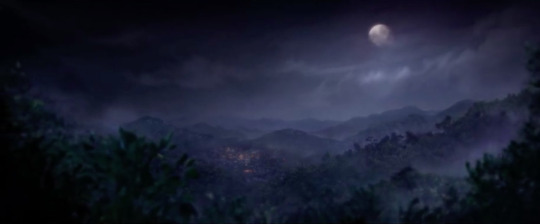
In the anime, Dafan Mountain is a scene that lasts one episode; in the novel, it’s several chapters and our first significant look at many of the characters. Besides changing Wen Chao’s death, Dafan Mountain was probably the scene most changed in adapting the novel into the donghua. In the donghua, the ghost hand was behind the stone goddess's possession, and L’il Apple the donkey is the creature caught in the nets; in the novel, both of these are changed: the goddess is something else entirely, and the nets accidentally catch people.
In my opinion (as with the Wen Chao change), it’s a good adaptation decision for the donghua to have made--the arc in the novel serves as a sounding point to symbolically summarize the whole story, but it doesn't work very well in a truncated visual medium which anime/donghua, by its nature, is. The donghua’s beginning was already disorienting (deliberately so, because we mimic Wei WuXian's experience being disoriented after being reborn in a new body, but perhaps a bit too much so), so having the previously established mysterious ghost hand play a role in the Dafan Mountain scene makes the story more succinct and easy to follow for viewers, as does having us fear for L’Il Apple whom we’re already attached to, as opposed to characters we don’t have time to get to know.
That being said, you do lose some of the beautiful symbolism of those chapters that is present in the novel. As a warning, what follows will have spoilers from the novel as translated by exiledrebelscans.
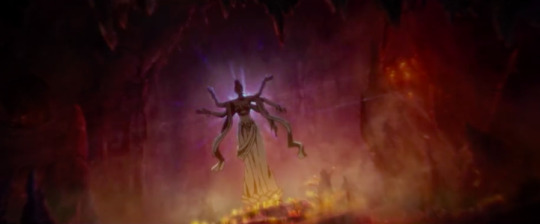
Dafan Mountain was an arc I appreciated more when I reread the novel, because I like missed a lot the first time around. It basically foreshadows the novel's major twists and turns, and also introduces the story’s major themes--society creating monsters, the sins of the fathers passing on to the children, and the butterfly effect/unintended consequences--quite explicitly.
Let’s begin by looking at the worldbuilding background and setting in which the goddess goes on her rampage. The story brings up classism pretty much right away, noting that the there is a small cultivation clan that plans to night-hunt on Dafan Mountain, and that:

Society asks people to earn respect, but sets them up to fail by providing incredibly difficult/near impossible stakes for them to be able to earn the kind of respect the more “highbrow, affluent” clans (yes, it uses those words) enjoy. The idea of society setting impossible standards is something this arc and the story as a whole deconstructs. Because what happens next is that Jiang Cheng, the leader of the YunmengJiang Sect (one of those highbrow affluent sects) refuses to allow the smaller sect to night-hunt. The people complain, noting that it’s not really fair, but at the same time, they have no power by which to oppose him.

In addition to keeping the smaller sects from interfering with Jiang Cheng’s plan to have his nephew, Jin Ling, earn glory in Dafan Mountain, he buys him hundreds of deity-binding nets that are noted to be extremely expensive--and the nets also catch some of the people in the smaller sects by mistake. It’s significant symbolically that nets that are noted to be an extreme show of wealth are what catch poorer people up, and trap them. Society traps them.
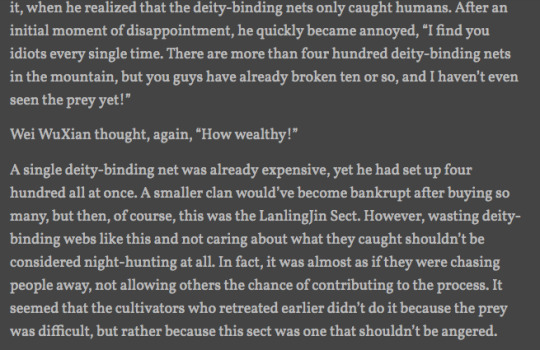
Not only does society trap them, it gives those with power all the power to free them, or not. It’s not really on the poorer sects to try and earn approval; they almost certainly can’t earn approval. It’s up to the larger sects to decide to give them respect or not, and they don’t. Jin Ling doesn’t treat them as though they matter--he doesn’t even set them free. He views them as an inconvenience because society offers him no reason to respect them (and he’s a bratty teenager)


Aaaand enter Jiang Cheng, Jin Ling’s uncle who set all of the nets up. He teaches Jin Ling this attitude, of people having to earn respect but not giving them much actual chance to do so, on a far more personal level, thereby showing that society’s rot is far more insidious and also nuanced than just “wealthy people suck.”

Also of note: the story will later show us that Jiang Cheng is literally reenacting his greatest pain onto his beloved nephew. He was never able to earn his father’s approval, nor his mother’s, and noted as much to his favored adopted brother Wei WuXian that his father “just doesn’t like me. He doesn’t like my mother, so he doesn’t like me.” Still, Jiang Cheng repeatedly drives himself to extremes trying to earn his father’s approval--and he never gets it. By ordering Jin Ling to succeed and earn his respect or else (even if it’s a more empty threat than not) he’s passing down the sin his father passed onto him.
Jiang Cheng is also not considering the consequences of his own words. He loves his nephew and just rescued him, so the audience likely knows this is an empty threat--but words still have consequences. Every action, and speaking is an action, has an effect and sometimes we can’t control what the effect is. Jin Ling will later almost lose his soul in the battle with the goddess, purely because he wants to prove himself and chooses to fight the goddess on his own instead of sending up a signal to ask for help. And Jin Ling even directly tells (a frantic) Jiang Cheng that this was his fault:

Next, let’s look at the goddess herself and her symbolism. The goddess was originally just a hunk of rock that happened to look like a dancing woman. And yet years and years of worship turned the slab of rock into an actual monster.
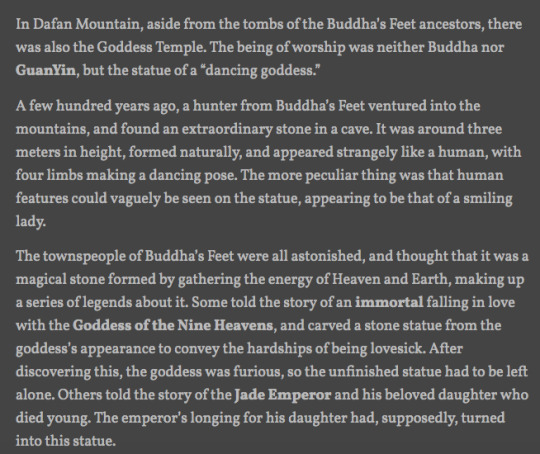

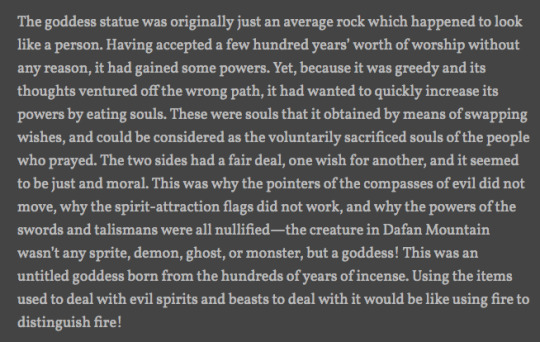
The story isn’t condemning of the people, though--it’s not surprising nor wrong for people to want to find meaning and beauty around them. The problem is that things get out of hand, and people lose control of what they’ve created, and lose what the truth is as stories spread and spread. What society teaches is unreliable, in other words, and rumors and truth aren’t easily distinguished. It’s also worth noting that the dancing goddess’s myth is passed on through several generations, so again, it’s the stories of the parents passing onto their children (and later harming them). Once you start something, you can’t control it--it has unintended effects. The goddess is a symbol for society itself: people decide it has value and by doing so they create a monster that eventually consumes the desperate people praying to it. The rich trap the poor, the ‘righteous’ thing it do changes depending on who society has determined the villain is, and either way it consumes innocent victims (lots of innocent people will die in the wars in MDZS--whether it’s the Sunshot Campaign, the aftermath, the Nightless City Massacre, the Siege of the Burial Mounds, or the corpses that attack a cave).
If you’ve finished the novel (or most of it) you’ve probably realized where this is going symbolically.
To return to the concept of empathy for the people in the mountain, who could not have known what would happen, it’s also worth noting that the soul-consuming begins with the goddess consuming the soul of a scared man seeking refuge from a storm, a man who desperately wants to matter:
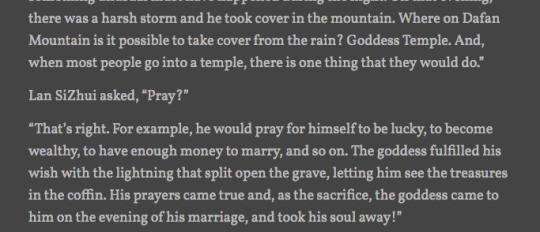
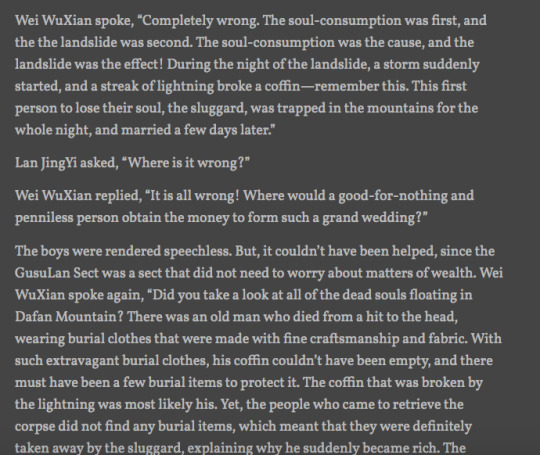
The entirety of MDZS rests on two men who were scared and desperately wanted to matter: Wei WuXian, and Jin GuangYao. The people on Dafan Mountain who lose their souls to the goddess symbolize both of them (since they are foils) in that they didn’t consider the consequences of their actions and wound up losing themselves. Wei WuXian goes half-mad at the Nightless City and is later literally torn apart by his own creations....
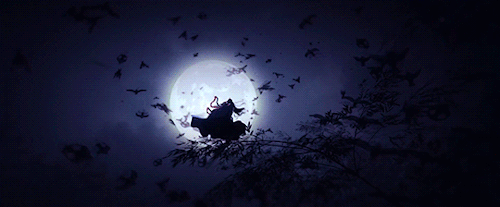
... which for what it’s worth are noted at the beginning of the Dafan Mountain arc to still be in use, yet they are not working against the goddess, because for all Wei WuXian’s inventions, he could not control everything, and in the end lost control of himself as well. But of course Wei WuXian had a helping hand in that, because Jin GuangYao is the only character who throughout the story knows exactly what society is--a monster--and manipulates it to steal away what he needs it to steal away in order to maintain power. By the end of the story, his own crimes--the dead body of the sworn brother he killed--is what kills him. He thought he could control it, but he couldn’t. Yet Jin GuangYao is a victim too, and the story repeatedly emphasizes this (and does a fantastic job at it--he’s very hard to hate).
The parallels and foreshadowing for both Wei WuXian and Jin GuangYao’s stories continue with a description of how the other people lost their souls:
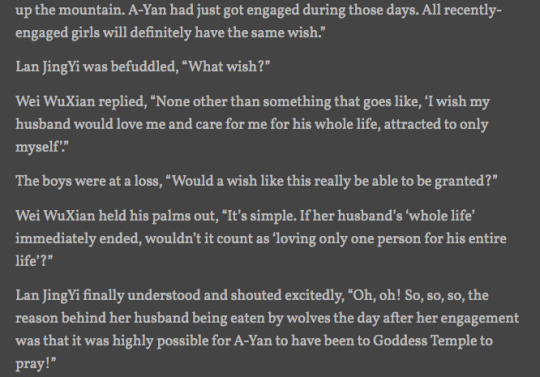
As we later find out, a marriage that is not what it seems later is a major twist in the story. Jin GuangYao found himself trapped in a wedding to a wife he found out just before his wedding was his sister--and whom he’d already gotten pregnant. The father who had scorned and hated him was tolerant of him and approved the match, his bride’s mother told him it was a rape and she didn’t want her husband to know his daughter wasn’t his daughter, and honestly, he was too scared to rock the boat and it’s hard to fault him. As a result he winds up losing himself even more, killing his son and later his wife. This description is symbolic of Jin GuangYao trapping himself in a wedding that would really just lead to ruin and death, not what he meant at all. And it winds up hurting the people who genuinely cared for him--his innocent son, his wife/sister, Nie MingJue, Lan XiChen.
Wei WuXian, too, in his desire to help Jiang Cheng get revenge on the Wens, will later wind up hurting and almost destroying the Jiang Sect despite that never being his intention, when he loses control. And there’s direct foreshadowing of that here as well:
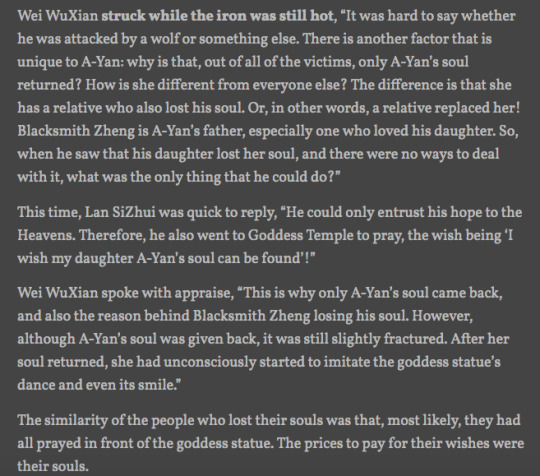
The father's sacrifice parallels Wei WuXian’s sacrifice of his golden core for Jiang Cheng, and also Xiao XingChen’s sacrifice of his eyes for Song Lan (but Yi City will be its own meta). All of these sacrifices are noted to have drastically unintended consequences that actually wind up harming the relationships they attempted to maintain, though none of the sacrifices could be called anything but beautiful love. Xiao XingChen’s blindness is exactly what enables him to be tricked into killing his best friend, and Wei WuXian’s inability to tell Jiang Cheng for fear of offending him only leads Jiang Cheng to believe he is motivated to cultivate demonically because of arrogance. As a result Jiang Cheng starts to lose himself to pettiness and revenge, and Wei WuXian to his worser instincts as well--isolation (he’s always felt lonely) and to his martyr complex. Greed and the need to keep getting stronger are things that destroy Wei WuXian in the end (before he gets a second chance), but also are still destroying Jiang Cheng.
And with that, let’s transition to the resolution and aftermath of the battle with the demon goddess.

The goddess is provoked into attacking by Jin Ling, and it’s fairly karmic as well. Jin Ling expresses how hurt he was by Wei WuXian (who did not know who he was) taunting him for not having a mother, how hurt he was by a careless, ignorant word. And it’s Jin Ling’s careless, ignorant words that lead to one of his fellow disciples losing their soul.
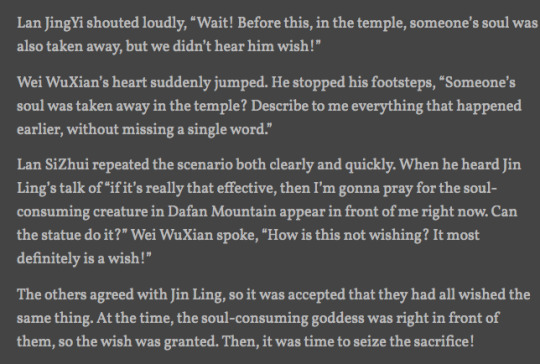
Society repeats its mistakes and does not learn (the fact that society is still using Wei WuXian’s creations is certainly a sign of this--though like everything it’s nuanced). And Jin Ling himself almost loses his soul as a result of trying to prove himself, but Jin Ling and the other disciples are repeatedly examples of hope in the story, hope that the novel’s conclusion will emphasize in its message that while society repeats itself, there is progress, and we are able to see Jin Ling and the others moving on from the hatred and prejudices that consumed the older generations. (We also see Wei WuXian, Jiang Cheng, Lan WangJi, etc. moving on, but the younger generation is even less encumbered by society’s poison). Society might not learn, but Jin Ling does.
But who saves Jin Ling in the novel from losing his soul and in the donghua from losing his life is also massively important thematically, and for foreshadowing: the Ghost General, Wen Ning.

Wen Ning uses the chains he has been kept in for thirteen years to tear apart the goddess/society. The chains we will later learn were put on him by Jin GuangYao, a person turned monstrous thanks to the cruelty of society, who kept him imprisoned for years and years. Wen Ning is loathed by society his entire life: firstly, when the Wen Sect is in power, for being weak and a stutterer, then for being a Wen even though he helped the opposite side (which directly foils him with Jin GuangYao as well, since both were more or less moles), then as a monstrous fierce corpse who was used to kill people.
But he saves Jin Ling--and all of them--by destroying the goddess. And Wen Ning will later save Jin Ling again in the novel’s climactic scene, at a temple to another goddess.

And, of course, there’s Lan WangJi, who plays an important role in unraveling the hell of Dafan Mountain, because his later canon romance with Wei WuXian is incredibly thematic in how it provokes characters to change their perceptions of society, and its his love for Wei WuXian that encourages both of them to grow to a place where they’re able to dismantle society’s presumptions.
From the very beginning of the Dafan Mountain scene, we find out it’s Lan WangJi who destroys the deity-binding nets and sets the trapped people free.
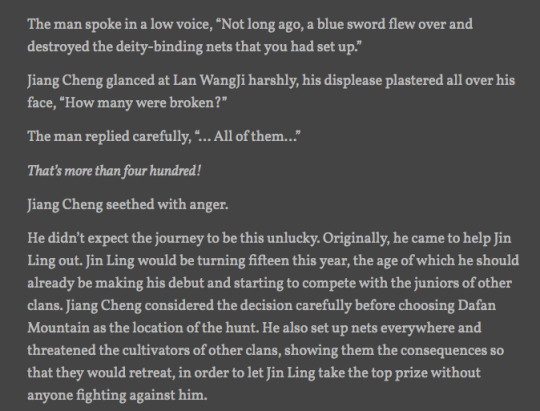
When Wei WuXian uses his signature flute-playing to summon Wen Ning and save them all, Lan WangJi sees him for who he is. He doesn’t recognize Wei WuXian because of his technique, though--as Wei WuXian notes, hundreds use his techniques--but because of the song he plays, a song Lan WangJi wrote and--unbeknownst to Wei WuXian--only ever shared with Wei WuXian. It’s through seeing a moment of his own vulnerability, through love, that he recognizes the person he loves has come back to life. The song is aptly named “WangXian” in canon, because their relationship is key to the story’s themes. Lan WangJi, so stringent and too by-the-rules, is encouraged to break from society repeatedly for Wei WuXian, and Wei WuXian is encouraged to think more about consequences through his relationship with Lan WangJi.

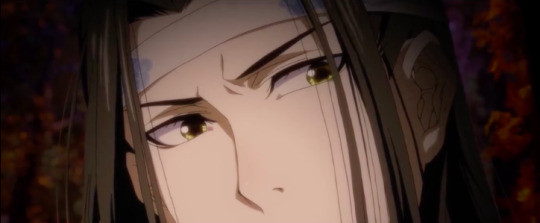
It’s also interesting that Jiang Cheng similarly recognizes Wei WuXian, but because of his technique and tries to force him to reveal himself via whipping his soul out with Zidian--but it doesn’t work, so he can’t confirm it until later. And what gets Jiang Cheng to release Wei WuXian to Lan WangJi is a topic the story does address head-on: the fact that the relationship between them is gay.
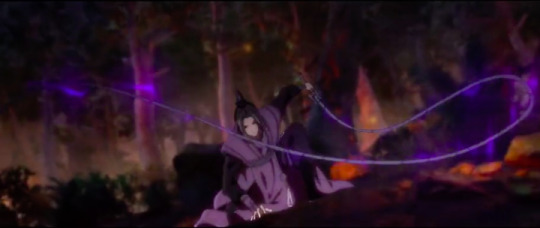
Homophobia is something bystanders brings up when Jiang Cheng is certain Mo XuanYu’s body is inhabited, as it is, by Wei WuXian, and it’s something Wei WuXian seeks to use to get both Jiang Cheng and Lan WangJi (whom he hasn’t realized recognizes him) to release him by teasing him that he’s not attracted to Jiang Cheng but is attracted to Lan WangJi. Wei WuXian would rather depart from society all together, but that’s not what the story aims for even as it does take down society. Connection is important, connection keeps us going, and isolating himself has always been a flaw of Wei WuXian’s.
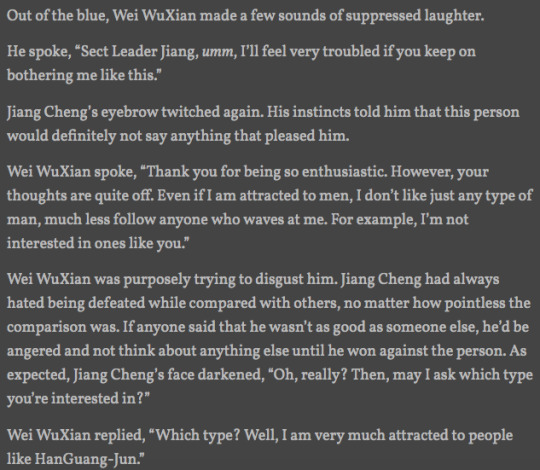

Of course, Lan WangJi is in love with Wei WuXian, though no one but his family knows this--but it’s when Lan WangJi slowly stops caring what people think about that aspect of him that he and Wei WuXian are able to get together, and so begins the first aspect of Lan WangJi breaking with societal expectations for the person he loves. He also offers some words of wisdom fitting for the events that have just happened: mark your words. Watch what you say. It actually does matter. And for MDZS, that a significant factor of what helps topple some of society’s rules and encourages people to grow towards empathy is WangXian--a gay couple who marry each other--really does matter.
#mdzs#mdzs meta#mao dao zu shi#wangxian#mo dao zu shi#lan wangji#jin ling#jiang cheng#wei wuxian#dafan mountain#homophobia tw
261 notes
·
View notes